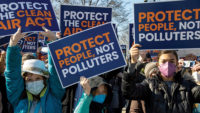The U.S. Supreme Court’s decision to reinstate a Trump-era rule curbing state authority to deny federal Clean Water Act permits for construction projects could cause more confusion for states as well as for the regulated community, say environmental attorneys involved in the legal dispute.
But industry groups and some states that support the 2020 Trump restriction are praising the court’s April 6 temporary order and say they plan to push aggressively to see it made permanent.
The Supreme Court issued an order, in response to an emergency request by fossil-fuel companies and several states, that reinstates the Trump administration curb on state and tribal authority to overrule or delay federal project permits—until related litigation in the US appeals court in San Francisco is decided. The high court did not provide its rationale for issuing the order, which was unsigned.
Four justices, including Chief Justice John Roberts, dissented. Justice Elena Kagan said the American Petroleum Institute, the Natural Gas Association, Louisiana and several other states requesting the emergency action had failed to demonstrate they would suffer “irreparable harm” if the Trump regulation was not put back in place. She wrote that they “have not identified a single project that a state has obstructed in the five months since the district court’s decision.”
The organizations and states filed the emergency request that a “stay” imposed by a federal judge in October 2021 be lifted so that the Trump rule could go back into effect. They filed the emergency request with the Supreme Court after the San Francisco appellate court refused to lift the stay while a case challenging the rule moved forward.
The U.S. Environmental Protection Agency, which now is developing a new rule to replace the Trump regulation, sent a draft proposed regulation to the Office of Management and Budget for review. EPA plans to release the proposed rule sometime this spring.
Groups such as the American Petroleum Institute, the National Hydropower Association and the Interstate Natural Gas Association say the 2020 Trump rule removes bureaucratic hurdles to getting projects approved. They say that prior to the Trump revision, states could withhold certification needed under Section 401 of the clean water law—a necessary step for getting a project built–for years, often for reasons having nothing to do with water quality.
An Interstate Natural Gas Association spokesperson said that a federal district court ruling vacating the Trump rule “in its entirety, without receiving a single merits brief, was clearly unlawful and a stay pending appeal was the only effective relief under the circumstances. We look forward to prosecuting the appeal in the [appeals court] and participating fully in the administrative process on potential revisions to the rule.”
LeRoy Coleman, a spokesperson for the National Hydropower Association, said in an emailed statement, that “hydropower projects often languish for years awaiting a state decision on the water certification, and those certifications often contain license conditions that are completely unrelated to water quality.” He said that with nearly 30% of existing hydropower licenses set to expire by 2030, “it is imperative that we preserve the fleet by ensuring certification requests as part of relicensing are decided within a reasonable timeframe.”
Protecting Waterways
Section 401 of the Clean Water Act gives states and tribes authority to deny a permit to construction projects that would cause illegal discharges into protected waterways. The Trump rule imposed new restrictions on states that made it more difficult for them to challenge or deny certification for projects that could be harmful to the environment, environmental sources say. Some of the changes included shortening the time states had to deny a permit, and limiting the information companies needed to provide about their projects. It also said that certification could not be denied for non-water quality reasons such as climate change.
Moneen Nasmith, a senior attorney at Earthjustice, which is representing tribes and environmental groups in the litigation opposing the Trump regulation, says the order will create a chaotic situation for states and tribes trying to protect waterways.
“We’ve heard a lot of reports from the brief period of time when the Trump rule was in effect that it really was already causing a tremendous amount of confusion and chaos,” she said. Section 401 certifications for most projects are typically a fairly routine process, she says, but it was turned on its head with the Trump rule, which is “such a radical departure from the way things have been done for the past 50 years.”
Andrew Hawley, a senior staff attorney for the Western Law Center, which is representing American Rivers in the litigation, says that states and tribes were not able to develop their own regulations to be able to comply with the 2020 rule while also remaining faithful to the intent of the Clean Water Act because the rule was only in effect for a short time.
He said the Supreme Court's action has "thrown the legal proceedings into disarray," adding that “everyone is going to be scrambling for the foreseeable future to try to figure out how to implement the very narrow and overly restrictive elements of this [2020] regulation.”
Larry Liebesman, a senior adviser with water resources consulting firm Dawson & Associates, said of the court's action, "Bottom line, it's a plus for construction projects that are waiting for state water quality projects, in the interim."
Liebesman, a former senior trial attorney in the Justice Dept.'s Land and Natural Resources Division, also said in an interview that if the Biden administration's expected new regulation becomes final, "That could reverse the benefits gained by this stay order."





